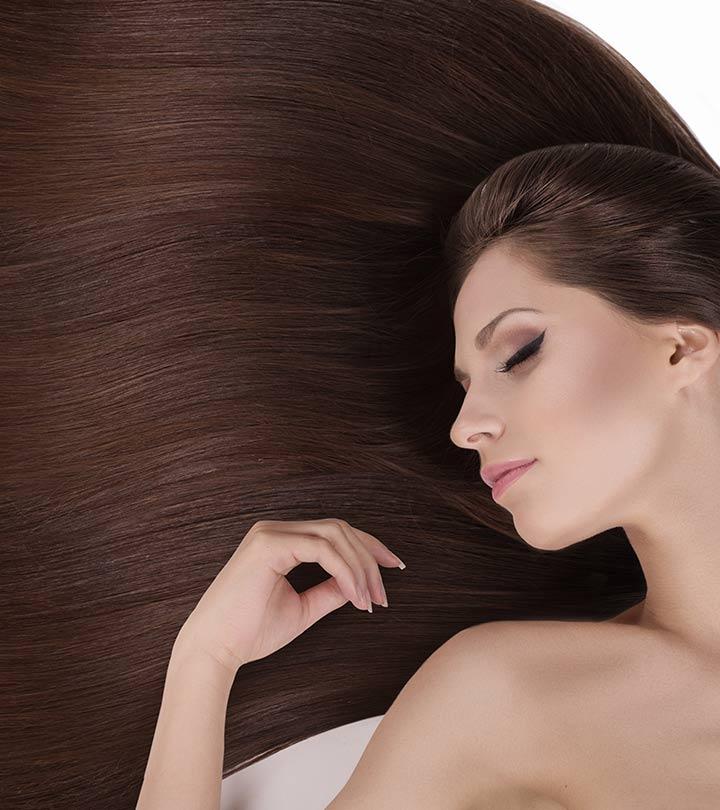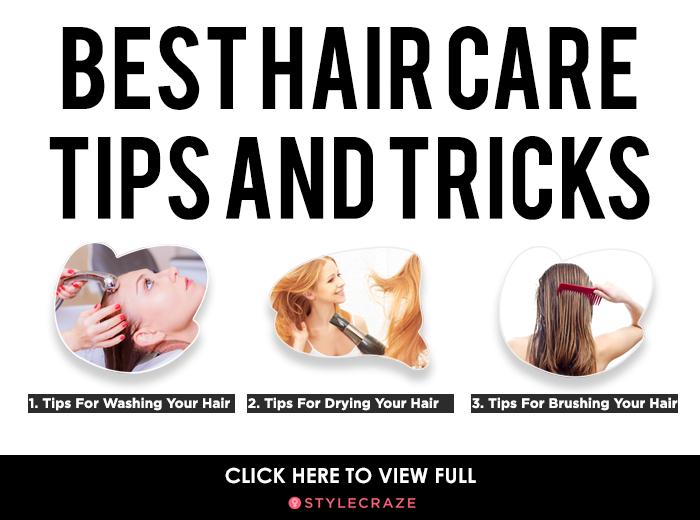How To Create A Hair Care Line

Let's face it, your hair has a mind of its own and does pretty much whatever it wants on a daily basis. There may be days when you feel like it's completely out of control. But there is one way that you can show your hair who's the boss and gain back control – and that's through a proper hair care routine.
You don't have to completely overhaul your current hair care routine and buy all new hair products. But there are certain simple tips and tricks that you can follow that can bring about a massive improvement in your hair in just a few days. Let's check them out!

Best Hair Care Tips And Tricks
1. Tips For Washing Your Hair
There are actually a few things you could be doing wrong in the shower that is stopping your hair from looking its best. Let's look at some tips you can try out:
- Oil your hair: Oiling your hair before washing it is probably the best thing you can do for your mane. Massage some coconut oil, olive oil, or almond oil onto your hair and scalp an hour before getting into the shower to pre-condition it (1), (2). Use lukewarm or cool water: Hot water can damage your hair in the same way that the heat from heat styling tools does – by dehydrating your hair and causing split ends. Always wash your hair with either lukewarm or cool water to close the hair cuticles and retain the moisture in it.
- Dilute the shampoo: We're all prone to using 2-3 pumps of shampoo when washing our hair. But the harsh truth is that shampoo strips your hair of its natural oils, leaving it dry. To prevent that from happening, dilute 1-2 pumps of shampoo in half a mug of water and then use that to wash your hair.
- Gently massage: Don't rub your head harshly when shampooing it. Instead, gently massage your scalp and hair with your fingers in small, circular motions while shampooing it to prevent excessive tangling and damage (3).
- Apply conditioner only on the ends: Applying conditioner all over your hair from root to tip can create a lot of build-up on the scalp (4). Apply conditioner only from the mid-length to the ends of your hair and wash it off after 2 minutes.
- Don't wash your hair every day: The last and most important tip for washing your hair is this – Don't. Wash. Your. Hair. Every. Day. While you may think you are being very hygienic, all this will do is dehydrate and damage your hair, strip it of its natural oils, and make it more prone to breakage and hair fall.
2. Tips For Drying Your Hair
You may not know this, but there is a high chance that you are unleashing a world of damage on your hair while brushing and drying it. Here are a few things you need to keep in mind once you step out of the shower:
- Use a microfiber towel: Pre-dry your hair with a microfiber towel once you step out of the shower. Avoid using a terrycloth towel as it can tangle your hair too much, increase frizz, and cause it to break.
- Avoid blow drying: The heat from blow dryers damages your hair just as much as heat styling tools do. It is best to apply a leave-in conditioner all over your damp hair and let it air-dry.
- Blow dry only after your hair is partially dry: If you absolutely cannot stop using a blow dryer, make this one simple adjustment. Blow dry your hair once it is 70% dry. This gives time for your hair cuticles to close up and will reduce the heat damage.
3. Tips For Brushing Your Hair
Yes, there is a bit more nuance to brushing your hair than going straight at it with the hairbrush/comb of your choice every morning. After all, knots and tangles are a major cause of hair breakage. Here's what you need to do:
- Detangle in the shower: Detangle your hair in the shower with a wide-toothed comb while there's conditioner in it. This is when your hair is soft and malleable, thus making it easier and less painful to detangle it.
- Use a boar bristle brush or wide-toothed comb: If you have been using a round brush or metal brush to detangle your hair, you need to stop right away. These brushes are meant to be used when you are blow-drying your hair. For everyday use, opt for a boar bristle brush, wide-toothed comb, or stagger toothed comb to remove the knots and tangles from your hair.
- Detangle from the ends to the scalp: You may not know this, but detangling your hair from the roots to the ends can create more knots and ultimately lead to more breakage. The correct way to go about it is to start a few inches above the ends and brush downwards, slowly working your way up to the scalp.
4. Tips For Heat Styling Your Hair
There are two things you need to keep in mind when you use heat styling tools like the curling wand or straightening iron on your hair:
- Avoid heat styling: While it is best that you stopped using heat styling tools altogether, a good compromise is to limit your heat styling to once or twice a week. After all, applying heat to your hair too often can cause split ends and damage to your hair (4).
- Apply heat protectant: Always, always, always apply a heat protectant to your hair before straightening or curling it. This acts as a barrier between your hair and the heat, thus protecting your tresses from untold damage.
5. Tips To Protect Your Hair From The Sun And Pollution
You may not know this, but every time you step out, your hair is being bombarded by the sun and the innumerable pollutants floating around in the air. Hence, it is super important that you take some steps to protect your precious tresses from them:
- Wear a hat/scarf: Cover your hair when you step outdoors, especially during summers. A hat or a scarf can go a long way in protecting your hair from intense sun damage.
- Don't step out with oily/wet hair: Don't step out right after you have oiled or washed your hair as it can make dust and dirt stick to it.
- Use a hair sunscreen: Invest in a hair sunscreen and use it religiously to protect your hair from the ultraviolet (UV) rays of the sun.
- Tie up your hair: Leaving your hair open and loose when outdoors can make it more prone to dryness and damage. Tie up your air when heading out into the world.
- Deep condition: Deep condition your hair at least once a week to cleanse your scalp completely and restore moisture back into your dull, dry hair (4).
6. Tips For Styling Your Hair
There are just a couple of things you need to keep in mind when styling your hair. These include:
- Use soft hair elastics: Only use soft hair elastics when tying up your hair. Avoid using rubber bands and the hair elastics that have a metal clasp in the middle as they can tug on your hair and cause breakage.
- Don't tie your hair up tightly: Don't tie your hair up in very tight braids, buns, or ponytails as it can damage your hair and hair follicles and cause hair fall. It can also give you a raging headache.
7. Tips For Hair Care At Night
We tend to take care of our hair all through the day but jump straight in the bed without paying heed to how we could be damaging our hair while we sleep. Here are a few things you should be mindful of before falling asleep:
- Tie your hair up loosely: Tie your hair up loosely with a soft hair elastic or bandana if you like sleeping with your hair tied up. Tight ponytails and buns can pull at your hair strands and cause them to break as you toss and turn at night.
- Use a silk scarf/pillowcase: Wrap a silk scarf around your head or sleep on a silk/satin pillowcase. Cotton pillowcases tend to be more abrasive to your hair and cause frizz and breakage.
- Moisturize the ends: Rub a little bit of any hair oil of your choice (olive oil, almond oil, and argan oil work best) on the ends of your hair before going to bed to give them an extra moisturizing boost (4).
8. Simple Natural Treatments For Nourishing Your Hair
Yes, it is important that you use the right shampoo, conditioner, and styling products on your tresses. But you also need to give your hair some of nature's love by treating it to some natural home remedies. Here are a few that you can whip up in just a few minutes with things that you probably already have in your kitchen:
- Condition Your Hair With Olive Oil: Warm a little bit of olive oil in a glass bowl and massage it onto your scalp. Leave the oil in for 45 minutes before washing your hair as per usual. Olive oil is known to penetrate the hair shaft and protect it from within (5). The phenolic compounds in olive oil impart antioxidant properties to it that protect the hair from oxidative damage (6). It also has anti-inflammatory properties.
- Apple Cider Vinegar Mask For Dry, Damaged Hair: Mix one tablespoon of apple cider vinegar, two tablespoons olive oil, and three egg whites together and apply it all over your hair. Put on a shower cap and leave this hair mask on for 30 minutes before shampooing your hair. ACV is a hair care ingredient many bloggers swear by. It has antimicrobial, antifungal, and antibacterial properties (7), (8). These properties can help prevent scalp infections. It can also help reduce head lice, dandruff, scalp acne, alopecia, hair loss, and split ends (4).
- Yogurt For Dull Hair: Dampen your hair and massage half a cup of yogurt onto it. Leave it on for 20 minutes before shampooing your hair as usual. A study showed that probiotics are anti-inflammatory and reduce oxidative stress on the skin (9). This might apply to the scalp as well. Yogurt can also help reduce hair damage (4).
- Castor Oil To Reduce Hair Fall: Massage some castor oil onto your scalp and from the roots to tips of your hair. Leave it on for half an hour and then wash it off with shampoo. You may have to shampoo twice to remove castor oil from your hair completely. Castor oil is an emollient that moisturizes the hair (10).
- Henna To Repair Split Ends: Mix half a bowl of henna powder, four teaspoons avocado oil, an egg, and some water to form a thick paste. Apply this henna paste all over your hair and leave it on for two hours before washing it off with lukewarm water. Henna contains lawsone that bonds with protein molecules to enhance hair color (11).
9. Foods To Include In Your Diet For Healthy Hair
A lot of hair care may seem to involve applying some stuff or doing some other things to it. But, in reality, a major part of hair care is dependent on what kind of food you eat (12). Here are a few things you can include in your diet to boost your hair health:
- Eggs: The protein provided by eggs is a major source of nutrition and growth for your hair (13).
- Citrus fruits: Citrus fruits like lemon, lime, and orange are great sources of vitamin C (14). This vitamin can boost the production of collagen that is essential for the strength and growth of your hair.
- Dry fruits and nuts: Munching on dry fruits as a snack is a great idea because they contain omega-3 fatty acids that nourish and thicken your hair (15).
- Green leafy vegetables: Green leafy vegetables (like spinach) are excellent sources of iron (16). Iron deficiency can lead to hair loss.
- Carrot: This root vegetable provides vitamin A that is essential for the production of the natural oil sebum that nourishes your hair (15).
- Avocado: The vitamin E provided by avocado helps maintain oil levels and pH balance on your scalp that ensures your hair follicles don't get clogged up and stop hair growth (16).
- Whole grains: Whole grains provide a range of nutrients, like iron, biotin, zinc, and B vitamins, which are essential for hair growth.
These are the hair care tips to keep in mind to ensure the health of your hair. If you experience constant hair fall or thinning hair, consult a doctor to address the underlying cause of this problem.
Frequently Asked Questions
Is it okay to comb your hair in the shower?
Yes, it is okay to comb your hair in the shower as long as you are doing it after applying some conditioner to it.
What would happen if you brush your hair too much?
Brushing your hair too much can cause frizz and breakage.
Is it okay to wash your hair twice in one day?
No, you should avoid washing your hair twice in one day as it can dehydrate and damage your hair.
Is it better to comb or brush curly hair?
It is better to comb your curly hair as brushing it can ruin your curl pattern and make it frizzy.
Is it better to let your hair air dry?
Yes, it is better to let your hair air dry as the heat from the blow dryer can damage your hair.
16 sources
Articles on StyleCraze are backed by verified information from peer-reviewed and academic research papers, reputed organizations, research institutions, and medical associations to ensure accuracy and relevance. Check out our editorial policy for further details.
- Effects Of Mineral Oil, Sunflower Oil And Coconut Oil On Prevention of Hair Damage, Journal of Cosmetic Science, US National Library Of Medicine, National Institutes Of Health.
https://www.ncbi.nlm.nih.gov/pubmed/21635851 - Hair Cosmetics: An Overview (2015), International Journal Of Trichology, US National Library Of Medicine, National Institutes Of Health.
https://www.ncbi.nlm.nih.gov/pmc/articles/PMC4387693/ - Standardized Scalp Massage Results in Increased Hair Thickness by Inducing Stretching Forces to Dermal Papilla Cells in the Subcutaneous Tissue, EPlasty, US National Library Of Medicine, National Institutes Of Health.
https://www.ncbi.nlm.nih.gov/pmc/articles/PMC4740347/ - Ethnopharmacological survey of home remedies used for treatment of hair and scalp and their methods of preparation in the West Bank-Palestine (2017), BMC Complementary And Alternative Medicine, US National Library Of Medicine, National Institutes Of Health.
https://www.ncbi.nlm.nih.gov/pmc/articles/PMC5499037/ - Investigation of Penetration Abilities of Various Oils Into Human Hair Fibers, Journal Of Cosmetic Science, US National Library Of Medicine, National Institutes Of Health.
https://pubmed.ncbi.nlm.nih.gov/16258695 - Anti-Inflammatory and Skin Barrier Repair Effects of Topical Application of Some Plant Oils, International Journal Of Molecular Science, US National Library Of Medicine, National Institutes Of Health.
https://www.ncbi.nlm.nih.gov/pmc/articles/PMC5796020/ - Antimicrobial Activity Of Apple Cider Vinegar Against Escherichia Coli, Staphylococcus Aureus And Candida Albicans; Downregulating Cytokine And Microbial Protein Expression, Scientific Reports, US National Library Of Medicine, National Institutes Of Health.
https://www.ncbi.nlm.nih.gov/pmc/articles/PMC5788933/ - Authenticating Apple Cider Vinegar's Home Remedy Claims: Antibacterial, Antifungal, Antiviral Properties and Cytotoxicity Aspect, National Product Research, US National Library Of Medicine, National Institutes Of Health.
https://pubmed.ncbi.nlm.nih.gov/29224370 - The Effect Of Probiotics On Immune Regulation, Acne, And Photoaging, International Journal Of Women's Dermatology, US National Library Of Medicine, National Institutes Of Health.
https://www.ncbi.nlm.nih.gov/pmc/articles/PMC5418745/ - Physiological and Medicinal Properties of Castor Oil, Recent Progress in Medicinal Plants, Research Gate.
https://www.researchgate.net/publication/327345451_Physiological_and_Medicinal_Properties_of_Castor_Oil - Determination of para-Phenylenediamine (PPD) in Henna in the United Arab Emirates, International Journal Of Environmental Research And Public Health, US National Library Of Medicine, National Institutes Of Health.
https://www.ncbi.nlm.nih.gov/pmc/articles/PMC2872353/ - The Role Of Vitamins And Minerals In Hair loss: A Review, Dermatology And Therapy, US National Library Of Medicine, National Institutes Of Health.
https://www.ncbi.nlm.nih.gov/pmc/articles/PMC6380979/ - The Golden Egg: Nutritional Value, Bioactivities, and Emerging Benefits for Human Health, MDPI Nutrients, US National Library Of Medicine, National Institutes Of Health.
https://www.ncbi.nlm.nih.gov/pmc/articles/PMC6470839/ - The Roles Of Vitamin C In Skin Health, MDPI Nutrients, US National Library Of Medicine, National Institutes Of Health.
https://www.ncbi.nlm.nih.gov/pmc/articles/PMC5579659/ - Diet And Hair Loss: Effects Of Nutrient Deficiency And Supplement Use, Dermatology Practical And Conceptual, US National Library Of Medicine, National Institutes Of Health.
https://www.ncbi.nlm.nih.gov/pmc/articles/PMC5315033/ - Iron, Office Of Dietary Supplements, US National Library Of Medicine, National Institutes Of Health.
https://ods.od.nih.gov/factsheets/Iron-Consumer/
Recommended Articles
- How To Keep Your Hair Healthy – 20 Tips + Home Remedies
- Daily Hair Care Routine For All Hair Types
- Top 22 Hair Care Blogs You Should Know About
- 10 Simple Homemade Beauty Tips For Hair
- Cantharidine Hair Oil Reviews
Was this article helpful?
The following two tabs change content below.
- Author

Arshiya Syeda is an editor at Stylecraze. Prior to that, she was a content writer and combined her writing and research skills to write over 200 high-performing articles on hairstyles, hair care, and skin care. She holds a bachelor's degree in literature and psychology and a post-graduate diploma in psychological counseling skills. She has also done a certificate course in basics of food and nutrition from Stanford University.As an editor, she edits and curates content centered around women's health, wellness, lifestyle, and beauty. She also helps her team members deliver polished and meticulously researched content. Arshiya aims to use StyleCraze's platform to demystify women's health and break down the taboos surrounding it. She also strives to curate content related to beauty and wellness that is inclusive and addresses the various intersections of race, body type, disability, and sexual orientation.
How To Create A Hair Care Line
Source: https://www.stylecraze.com/articles/best-hair-care-tips-and-tricks/
Posted by: holcombwhopribed.blogspot.com

0 Response to "How To Create A Hair Care Line"
Post a Comment